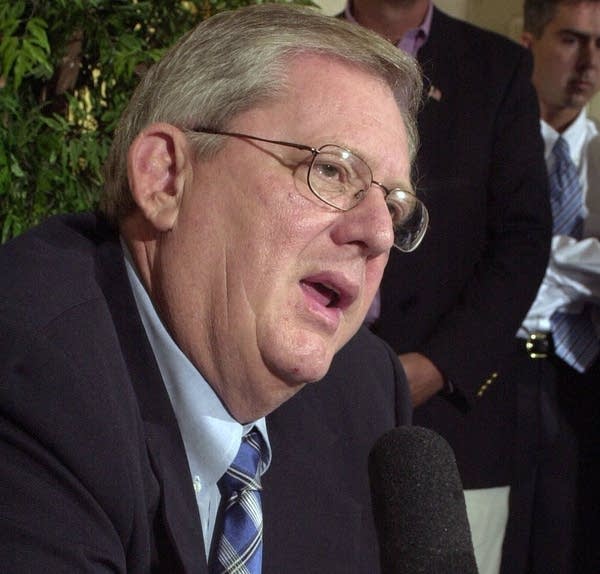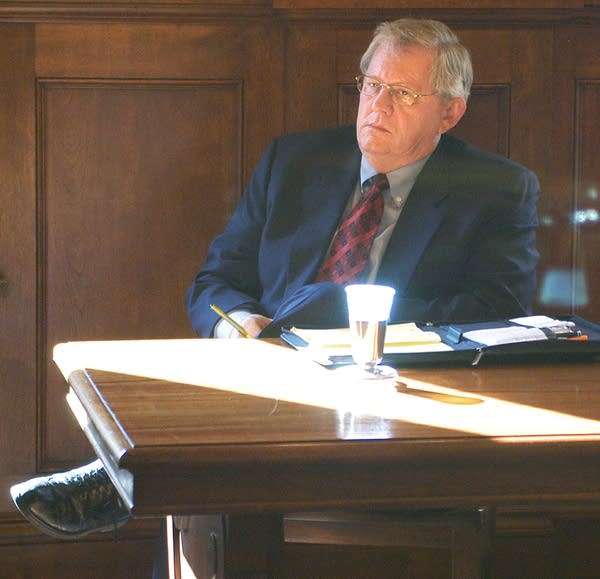Former SD Gov., US Rep. Bill Janklow dead at 72
Go Deeper.
Create an account or log in to save stories.
Like this?
Thanks for liking this story! We have added it to a list of your favorite stories.

Bill Janklow, a divisive politician who left a lasting mark on South Dakota politics by serving four terms as governor, died Thursday. He was 72.
Janklow's son Russ Janklow confirmed that his father died around 11 a.m. Thursday of brain cancer. Bill Janklow had announced in November that he had inoperable cancer, and Gov. Dennis Daugaard this week said Janklow had been moved to hospice care.
Janklow, a Republican, dominated South Dakota government for more than a quarter century, inspiring both fierce support and criticism. Even his political opponents admitted he got things done, though they decried his combative nature.
He was credited with saving rail service in the state, attracting credit card banks and leading the nation in connecting classrooms to the Internet.
Turn Up Your Support
MPR News helps you turn down the noise and build shared understanding. Turn up your support for this public resource and keep trusted journalism accessible to all.
"I'm an action-oriented person," Janklow once said. "I'm just more hyper than most people."
William J. Janklow was born Sept. 13, 1939, in Chicago. After the death of his father, who helped prosecute Nazis for war crimes, his mother moved the family to her hometown of Flandreau, S.D.
Janklow got in trouble in high school - a time he said he was "raising a lot of hell" - so he left to join the U.S. Marines.

He talked his way into the University of South Dakota, even though he had not graduated from high school, and he received a law degree from the school in 1966.
Janklow represented poor clients on the Rosebud Sioux Indian Reservation in 1966-1973, and the state hired him to prosecute members of the American Indian Movement for a riot at the Custer County Courthouse.
He was elected South Dakota attorney general in 1974 and governor in 1978, serving two four-year terms. He won re-election in 1982 by the widest margin in any gubernatorial race in state history, taking nearly 71 percent of the vote. He was elected governor again in 1994 and 1998, and he won election in 2002 as South Dakota's lone member of the U.S. House.
Janklow said he was always ready to fight for South Dakota and anything else he believed in.
He said he had a sign on the wall of the governor's office that said: "Dear God, please grant me patience - and I want it right now."
His critics labeled his style as governor dictatorial, but supporters pointed to his results.
While governor the first two terms, from 1979-1986, Janklow engineered South Dakota's purchase of rail line to save rail service in the state, got state interest-rate laws changed to lure Citibank and other credit card banks, and persuaded the Legislature to convert the University of South Dakota-Springfield campus into a prison.
He also negotiated a deal to sell Missouri River water to a company that wanted to build a slurry pipeline to ship Wyoming coal to southern states. The project failed, but South Dakota got $5 million out of the deal.
In 1986, Janklow lost the Republican Senate primary to the incumbent, Jim Abdnor. He then joined an investment firm and later entered a private law practice.
In 1995, after being elected governor again, Janklow persuaded the Legislature to pass his plan for cutting property taxes. He also won approval for building a new women's prison and facilities for juvenile offenders. In his second stint as governor, he won praise for making South Dakota a national leader in connecting classrooms in every school district to the Internet.
Janklow was elected to Congress in 2002, but was convicted of manslaughter in a traffic accident and never completed the term.
Janklow said the accident that killed motorcyclist Randy Scott of Hardwick, Minn., on Aug. 16, 2003, in Moody County north of Sioux Falls was his only regret. After attending an event in Aberdeen, Janklow was driving back to his home in Brandon when he sped through a stop sign.
"If I had to do it over, I'd do everything I did, but I'd stop at a stop sign," Janklow said, breaking into tears, when he announced he had brain cancer.
A jury convicted Janklow of second-degree manslaughter and three other charges, and he served 100 days behind bars.
Part of his defense was that as a diabetic, his senses and reflexes were dulled from low blood sugar and that he missed the early warning signs because a heart medication masked them.
In his leisure time, Janklow liked boating and listening to his large collection of 1950s rock 'n' roll records. He once bragged he was "the best fat-man water skier in South Dakota."
Janklow married his wife, Mary Dean, in 1960. They had three children.
(Copyright 2012 by The Associated Press. All Rights Reserved.)
Dear reader,
The trustworthy and factual news you find here at MPR News relies on the generosity of readers like you.
Your donation ensures that our journalism remains available to all, connecting communities and facilitating better conversations for everyone.
Will you make a gift today to help keep this trusted new source accessible to all?




